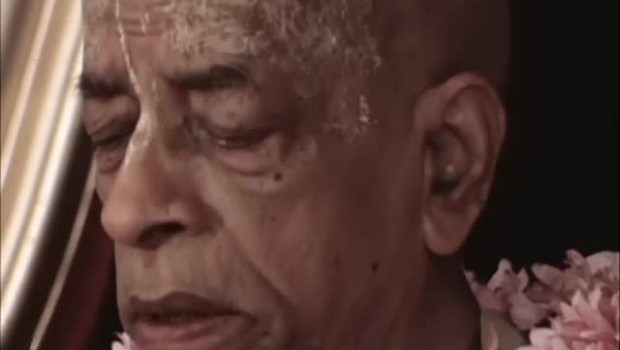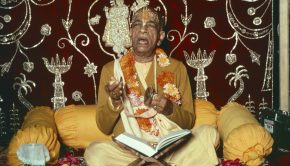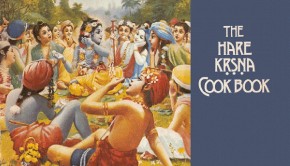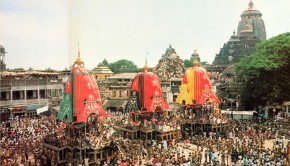Introduction to the Srimad-Bhagavatam by Srila Prabhupada — Video
Srila Prabhupada gives a wonderful introduction to the Srimad-Bhagavatam in Melbourne, Australia in 1974. The class is proceeded by a very nice Hare Krishna kirtan.
This is a conversation between Maharaja Pariksit and Sukadeva Gosvami.
Maharaja Pariksit, five thousand years ago he was the emperor of the whole world. Formerly, up to five thousand years ago, the whole world was being controlled and ruled over by kings whose capital was Hastinapura, New Delhi. There was only one flag, only one ruler, one scripture, Vedic scripture, and the Aryans, Arya, they were the civilized persons. You Europeans, Americans, you are also Aryans. Indo-European stock.
Maharaja Yayati, grandson of Maharaja Pariksit, he gave to his two sons the portion of eastern Europe, Greek and Roman. That is the history, Mahabharata. Mahabharata means great India.
So there was no different religion. One religion, Vedic religion. Vedic religion means to accept the Supreme Personality of Godhead as the Supreme Person Absolute Truth. This is Vedic religion.
Those who have read Bhagavad-gita, it is said there in the Fifteenth Chapter, vedais ca sarvair aham eva vedyam [Bg. 15.15]. Vedic knowledge means to understand God. This is Vedic religion.
Later on, with the progress of Kali-yuga… Kali-yuga means the dark age or the sinful age or the age for argument, unnecessary talks and fight. This is called Kali-yuga. That is going on. Since the last five thousand years, the Kali age has begun, and the beginning of Kali-yuga was cow-slaughtering.
…So at the present moment, practically there is no brahmana, no ksatriya, no vaisya, only sudras, fourth-class men. So you cannot expect any happiness guided by the fourth-class men. That is not possible. Therefore throughout the whole world there is chaotic condition. Nobody is happy.
So this is essential that the human society must be divided into four divisions. The brahmana class means the first-class ideal men, so that by the seeing their character, their behavior, others will try to follow. Yad yad acarati sresthah [Bg. 3.21].
So this Krsna consciousness movement means we are trying to create some first-class men. This is Krsna consciousness, this movement.
So therefore we have got these rules and regulation: no illicit sex, no meat-eating, no intoxication, no gambling. This is the preliminary qualification of a first-class man. So we are trying our bit to make some men ideal first-class men.
But formerly it was there. Catur… Still there is. You don’t think that all men are of the same intelligence or same category. No. Still there is intelligent class of men. Just like those who are scientists or philosophers, religionists, they are supposed to be first-class men. But unfortunately, now nobody can recognize who is first-class and last class.
So for proper management of the whole society the first-class, second-class, third-class men must be there. Just like in your body there are different parts of the body. The head, the arm, the belly, and the leg. This is natural. So without head, if we have simply the arms and belly and legs, it is a dead body.
So unless you are guided, the human society, by the first-class men, the whole society is dead society. There must division according to catur-varnyam maya srstam guna-karma… [Bg. 4.13], not by birth, but by quality.
So anyone can be trained up first class, second class, as he likes. That is called civilization.
…In mother’s womb we had a small body. It grows, and we come out. Again it grows. Grows… It is not actually growing, it is changing. The child is changing his body to baby, the baby is changing his body to boy, and the boy is changing his body to youthhood. Then… in this way you are changing body. That you have got experience. You had a child’s body-you remember. Or you had a boy’s body-you remember. But the body is no longer existing. But you are existing. Therefore the conclusion is that when this body will be no more fit for existing we shall have to accept another body. This is called tatha dehantara-praptih.
So we have to change. That is nature’s law. The soul is immortal. Na jayate na mriyate va kadacit na hanyate hanyamane sarire [Bg. 2.20]. The soul is not finished, simply a particular type of body being finished, no.
The people do not know it. And because they are simply engaged in sinful activities, their brain has become so dull that they cannot understand this simple truth that as you are changing body in this life therefore you will change this body to another life. This is very simple truth. But at the advancement of material civilization, we have become so dull and rascal that we cannot understand it.
…So Krsna consciousness means that you have to purify your senses. That is the way. sarvopadhi-vinirmuktam tat-paratvena nirmalam hrsikena hrsikesa-sevanam bhaktir ucyate. This bhakti means that we have to clear ourself from the designations. What is that designation? Everyone is thinking “I am American,” “I am Indian,” “I am European,” “I am Australian,” “I am cat,” “I am dog, “I am this, “I am that,”-bodily. We have to cleanse this bodily conception of life that “I am not this body.” Aham brahmasmi: “I am spirit soul.” This we have to realize. Then there will be no distinction that “Here is an American, here is an Australian, here is an Hindu, here is a Muslim, here is a tree, here…” No. Panditah sama-darsinah [Bg. 5.18]. Panditah means learned, one who knows things as they are. For them…
vidya-vinaya-sampanne brahmane gavi hastini suni caiva sva-pake ca panditah sama-darsinah. A person, very learned, vidya and very gentle… vidya means, educated means, he is gentle, sober. He is not rogues and ruffian. That is vidya. That is the test of education. He must be very sober and silent. That is called gentleman, in one word.
…brahma-bhutah prasannatm na socati na kanksati samah sarvesu bhutesu mad-bhaktim labhate param. When one is self-realized that he is not this body, he is the spirit soul, brahma-bhutah,
…then these two things will be finished if you become spiritually situated. brahma-bhutah prasannatma na socati na kanksat samah sarvesu bhutesu… Unless one is spiritually realized, he cannot see equally everyone. Then samah sarvesu bhutesu mad-bhaktim labhate param. Then one can become real devotee of the Lord, after surpassing the brahma-bhutah stage.
So this bhakti line is not so easy. But …what is Sri Caitanya Mahaprabhu’s instruction? Very simple. harer nama harer nama harer nama eva kevalam kalau nasty eva nasty eva nasty eva gatir anyatha [Cc. Adi 17.21] This is not Caitanya Mahaprabhu’s personal version. This is in the scripture, Vedic scripture. Brhan-Naradiya-Purana. This instruction is there.
As people are fallen in this age the method also has been offered very simple. They cannot follow any strong or severe austerities. It is not possible. They have been recommended simply to chant the holy name of God. That’s all. Anyone can do. It is not difficult at all. Then if you say that “You are from India. Your Caitanya is Indian, and He is recommending Hare Krsna. Why shall I chant? I have got my own God.” All right, if you have got your own God, then you chant His name.
Caitanya Mahaprabhu doesn’t say that you chant simply Krsna’s name. If you have got any relationship with God and if you know His name and address, then you chant His name. Unfortunately, you do not know who is God; neither you know His address, neither His activities. So take this Krsna. Here is a solid name. And we give you His address, His father’s name, His mother’s name, everything. So if you have got your own God’s name, Caitanya Mahaprabhu said you can chant. Have you got any name?
… the Krsna, His name, His form, His activities, His qualities, we cannot understand with these blunt material senses. It is not possible. Atah sri-krsna-namadi na bhaved grahyam indriyaih. Then? We have got this only possession, indriyas. How we shall understand?” Sevonmukhe hi jihvadau. If you engage your senses in the service of the Lord, svayam eva sphuraty adah, then Krsna will reveal to you that “Here I am.” This is the process.
Now this word is very significant. Sevonmukhe hi jihvadau. Jihva means tongue. If you simply engage your tongue in the service of the Lord, you will gradually develop. So how to engage the tongue? It is not said that “If you see, or if you touch, if you smell,” no. “If you taste.” So what is the business of the tongue? The business of the tongue-that we can taste nice foodstuff and we can vibrate.
Do these two jobs. Vibrate with your tongue Hare Krsna, and take as much as possible prasadam. And you become a devotee. Thank you very much.
…Test it. Make a trial. The temple is here. We are inviting. Come here. Do these two business. And our Madhudvisa Maharaja is ready to give you prasadam and chance for dancing and singing. That’s all. Where is the difficulty?
Guest: Srila Prabhupada, if the kings were taught to govern the whole universe, does that mean all the worlds, all the worlds in the universe?
Devotee: She’s just wondering how it would be possible for one king to rule the whole world? It seems like it is very difficult. Nowadays we have so many leaders and they cannot manage…
Srila Prabhupada: Forget that. Why you are thinking that you cannot rule over; therefore others cannot? You are thinking in your term. But there are. That is possible. So that is not our field of activities. It is others’, politics and… But let us…
Our business is how to improve our spiritual condition of life. Even if you don’t rule over the world, it doesn’t matter.
So why you are anxious to rule over the world? It is not our business. You chant Hare Krsna and take prasadam.













